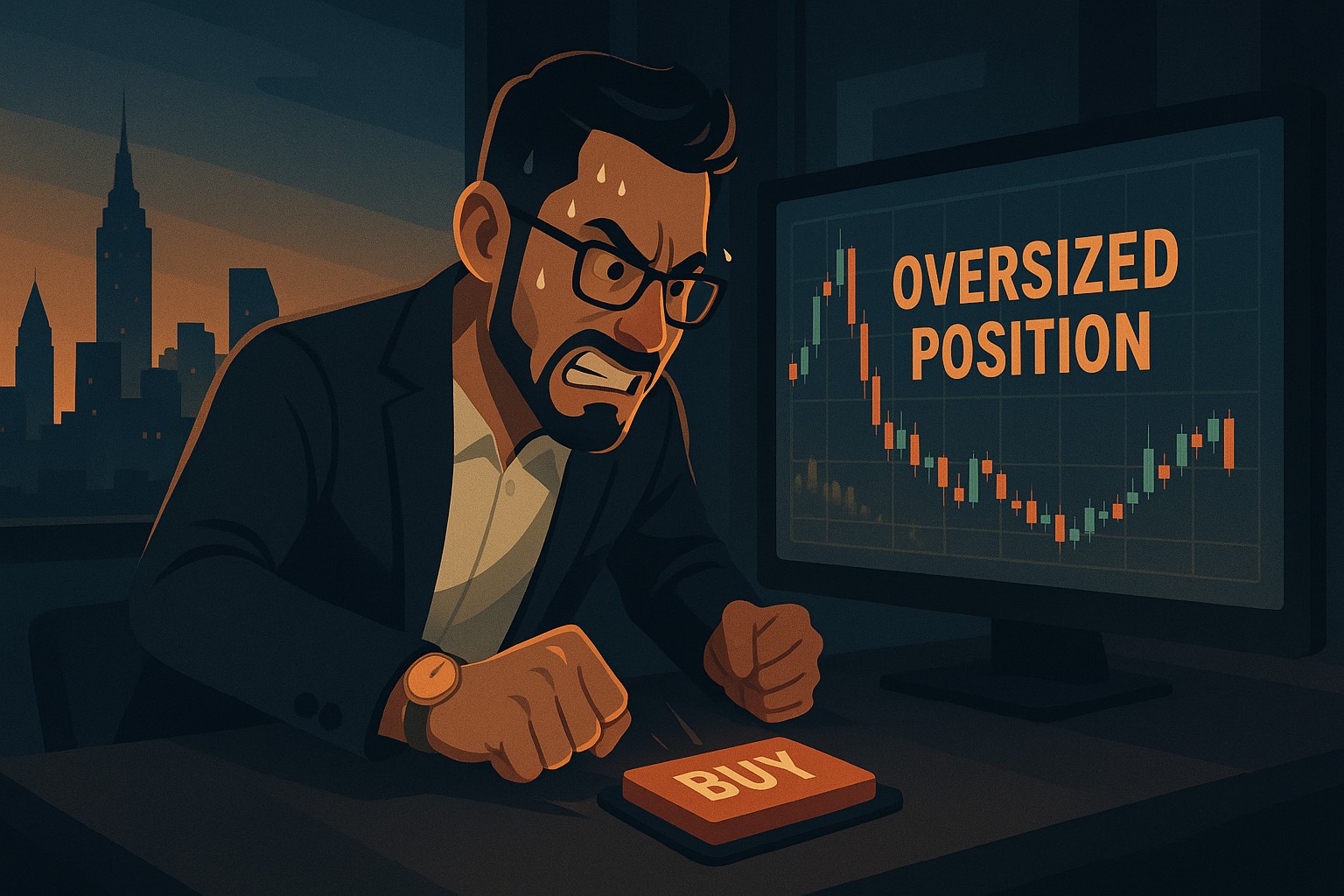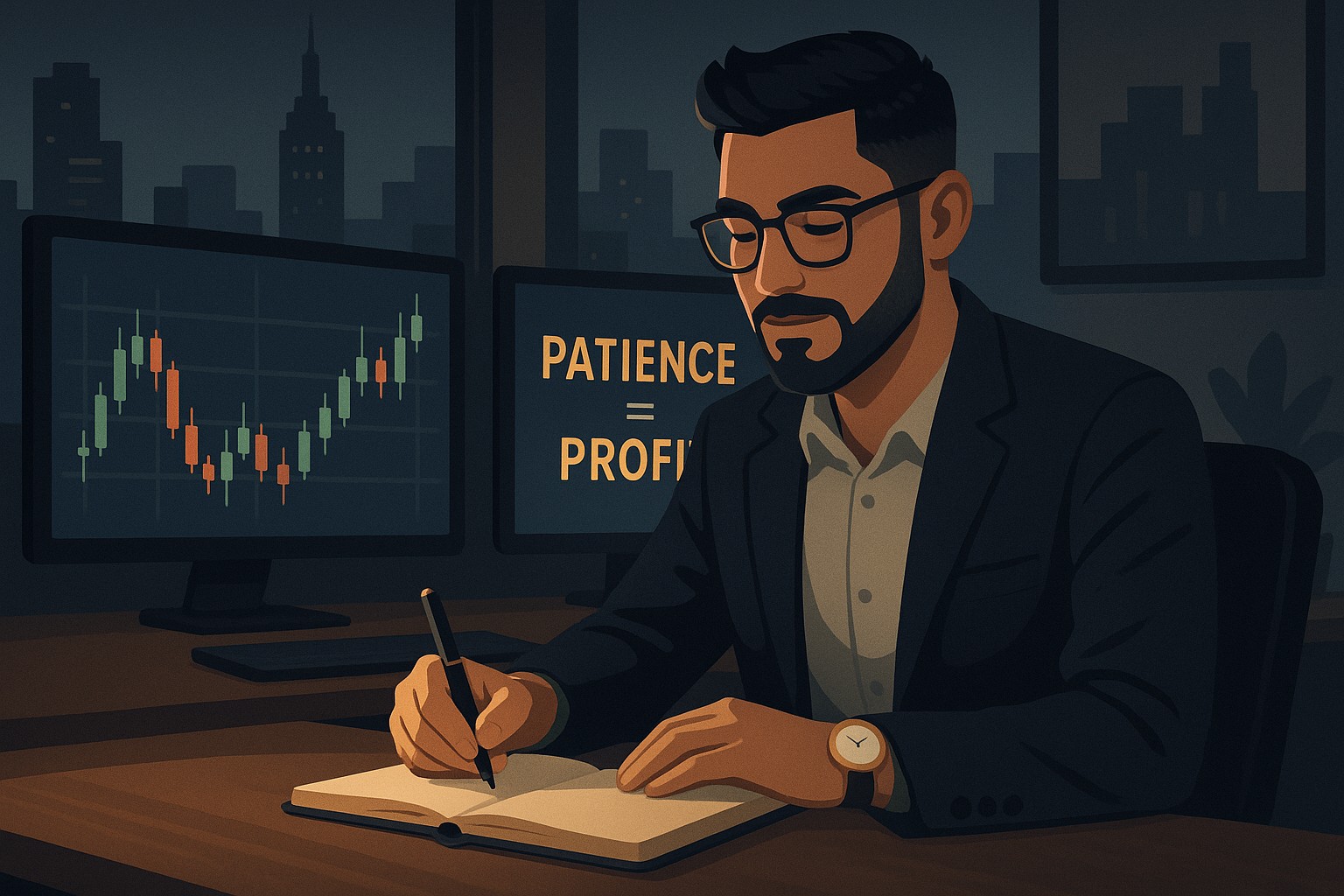Overcoming FOMO & Revenge Trading in Forex – Why Patience Pays
2025-08-29 12:37:22
Why FOMO & Revenge Trading Are Silent Killers

Every trader knows the feeling: the chart suddenly explodes, the candles fly, and you’re not in the move. Your heart races. Your cursor hovers over the buy button. That urgency is FOMO (fear of missing out) at work.
The problem is that FOMO makes you forget your plan. You enter late, right when the professionals are exiting. What should have been a winning day often flips into frustration.
And frustration has a twin: revenge trading. After a stop-out or a missed move, emotions take the wheel. Instead of following the plan, you press harder, increase risk, or force entries to “make it back.” But the market doesn’t reward desperation; it punishes it.
The market doesn’t punish lack of knowledge as much as it punishes lack of patience — a lesson echoed in Why Most Traders Fail – Trading Psychology & The Hidden Mental Game.
The Root Cause of FOMO & Revenge Trading

Both FOMO and revenge trading don’t appear out of thin air — they usually start with psychological blind spots and structural gaps in trading systems.
- Impatience: Traders expect fast results. When setups don’t appear quickly, the brain creates pressure to act, mistaking movement for opportunity.
- Comparison & Noise: Social media amplifies the urge. Seeing others post profits convinces you that you’re “missing out,” pushing you to chase trades that don’t exist in your plan.
- Ego & Loss Aversion: When a loss happens, the ego refuses to accept it. Instead of respecting the plan, it seeks instant repair — leading to revenge trades.
- Lack of Structure: Without pre-defined rules, emotions will fill the vacuum. Discipline isn’t natural — it has to be built into your system.
This is why frameworks like the Discipline vs. Impulse in Trading – Step-by-Step Guide are critical for traders who want to break free from emotional spirals.
The Price of a Missed Trade vs. a Forced Trade
Here’s the truth most traders avoid:
- A missed trade costs nothing. The only pain is psychological — the “what if” scenario in your head.
- A forced trade costs real money. When you abandon rules to chase the market, losses add up quickly.
That’s why professional traders repeat a mantra: “Patience pays. Impulse costs.”
Think of it like fishing. Sometimes the water looks calm, but the right catch isn’t there yet. Casting early only wastes bait. Waiting for the right moment ensures you reel in something worth keeping.
For deeper guidance on building this kind of patience, revisit Top 10 Ways to Prevent Emotional Trading and Stay Disciplined.
Practical Ways to Beat FOMO & Revenge Trading
- Set Daily Trade Limits – Cap how many trades you can take per session. This prevents spiraling into revenge mode.
- Build “If–Then” Rules – For example: If price sweeps liquidity + forms displacement, then I look for entry. Anything outside this, skip. See Fair Value Gaps Explained for a great way to define structure.
- Reframe Missed Moves – Instead of saying “I lost money,” say “I saved capital.” That mindset shift removes urgency.
- Trade Fewer Setups, Better – Focus on quality over quantity. Most great traders take only 1–2 A+ setups per day. The Moving Averages Trading Playbook shows how fewer, structured setups often outperform overtrading.
- Journal Emotional Triggers – Track when you feel the urge to force trades. Seeing your impulses on paper makes them easier to control.
Real-Life Analogy: The Casino Trap
Casinos thrive on two emotions: excitement when you’re winning and desperation when you’re losing. Both keep you playing until the house wins.
Trading without control is no different. FOMO is the excitement, revenge trading is the desperation. The only way to win is to step back, play your edge, and know when to walk away.
If you want more on how to navigate emotional traps, explore The Mental Game of Execution.
This Week’s Challenge
For the next 5 trading days, track every time you feel FOMO or the urge to chase back a loss. Write it down before acting. If you can walk away instead of forcing the trade, you’ve won — even without profit.
Remember: survival is the true edge. The traders who last are the ones who master patience, not the ones who catch every single move.
Final Thoughts

FOMO and revenge trading don’t destroy accounts because of the market itself — they destroy accounts because they hijack a trader’s discipline. They start small, with impatience or the fear of being left behind, but if unchecked, they snowball into emotional spirals that wipe out weeks or months of hard work.
The solution isn’t to fight the market; it’s to master yourself. Every missed trade is a reminder that you saved capital, and every avoided revenge trade is proof of discipline. In trading, survival comes first, profit comes second — and patience is the bridge between both.
For a full mindset reset, check out Managing Trading Losses: Why You Can Be Wrong and Still Win Big.
Start Practicing with Confidence - Risk-Free!
- Trade forex, indices, gold, and more
- Access ACY, MT4, MT5, & Copy Trading Platforms
- Practice with zero risk
It’s time to go from theory to execution - risk-free.
Create an Account. Start Your Free Demo!
Check Out My Contents:
Strategies That You Can Use
Looking for step-by-step approaches you can plug straight into the charts? Start here:
- How To Trade & Scalp Indices at the Open Using Smart Money Concepts (SMC)
- How to Trade Breakouts Effectively in Day Trading with Smart Money Concepts
- Complete Step-by-Step Guide to Day Trading Gold (XAU/USD) with Smart Money Concepts (SMC)
- The Power of Multi-Timeframe Analysis in Smart Money Concepts (SMC)
- Forex Trading Strategy for Beginners
- Mastering Candlestick Pattern Analysis with the SMC Strategy for Day Trading
- How to Use Fibonacci to Set Targets & Stops (Complete Guide)
- RSI Divergence Trading Strategy for Gold: How to Identify and Trade Trend Reversals
- Stochastics Trading Secrets: How to Time Entries in Trending Markets using Stochastics
- Gold Trading Stochastics Strategy: How to Trade Gold with 2R–3R Targets
- RSI Hidden Divergence Explained: How to Spot Trend Continuations Like a Pro
- Moving Averages Trading Strategy Playbook
- Mastering Fibonacci Trading Psychology – Trusting the Levels, Managing the Mind
- Mastering Price Action at Key Levels – How to Spot, Trade, and Win at the Most Crucial Zones
- Mastering Retests: How to Enter with Confirmation After a Breakout
Indicators / Tools for Trading
Sharpen your edge with proven tools and frameworks:
- The Ultimate Guide to Risk Management in Trading - A Complete Compilation for 2026
- Moving Averages Trading Strategy Playbook
- How to Think Like a Price Action Trader
- Mastering Fibonacci Trading Psychology - Trusting the Levels, Managing the Mind
How To Trade News
News moves markets fast. Learn how to keep pace with SMC-based playbooks:
- Why Smart Money Concepts Work in News-Driven Markets - CPI, NFP, and More
- How to Trade NFP Using Smart Money Concepts (SMC)-A Proven Strategy for Forex Traders
- How to Trade CPI Like Smart Money - A Step-by-Step Guide Using SMC
Learn How to Trade US Indices
From NASDAQ opens to DAX trends, here’s how to approach indices like a pro:
- How to Start Trading Indices and Get into the Stock Market with Low Capital (2026 Guide)
- Best Indices to Trade for Day Traders | NASDAQ, S&P 500, DAX + Best Times to Trade Them
- How To Trade & Scalp Indices at the Open Using Smart Money Concepts (SMC)
- NAS100 - How to Trade the Nasdaq Like a Pro (Smart Money Edition)
How to Start Trading Gold
Gold remains one of the most traded assets — here’s how to approach it with confidence:
- How to Swing Trade Gold (XAU/USD) Using Smart Money Concepts: A Simple Guide for Traders
- Complete Step-by-Step Guide to Day Trading Gold (XAU/USD) with Smart Money Concepts (SMC)
- The Ultimate Guide to Backtesting and Trading Gold (XAU/USD) Using Smart Money Concepts (SMC)
- Why Gold Remains the Ultimate Security in a Shifting World
- How to Exit & Take Profits in Trading Gold Like a Pro: Using RSI, Range Breakdowns, and MAs as Your Confluence
How to Trade Japanese Candlesticks
Candlesticks are the building blocks of price action. Master the most powerful ones:
- Mastering the Top Japanese Candlesticks: The Top 5 Candlesticks To Trade + Top SMC Candlestick Pattern
- How to Trade Candlestick Patterns with High Probability: A Complete Guide for Beginners
- The Top Japanese Candlestick Guide: What is an Engulfing Pattern and How to Trade It?
- Piercing Pattern Candlestick Explained: How to Trade It - Step-By-Step Guide
- Morning & Evening Star Candlestick Patterns - How to Trade Market Reversals with Confidence
How to Start Day Trading
Ready to go intraday? Here’s how to build consistency step by step:
- 5 Steps to Start Day Trading: A Strategic Guide for Beginners
- 8 Steps How to Start Forex Day Trading in 2026: A Beginner’s Step-by-Step Guide
- 3 Steps to Build a Trading Routine for Consistency and Discipline - Day Trading Edition
- The Ultimate Guide to Understanding Market Trends and Price Action
- Trading with Momentum: The Best Trading Session to Trade Forex, Gold and Indices
Learn how to navigate yourself in times of turmoil
Markets swing between calm and chaos. Learn to read risk-on vs risk-off like a pro:
- How to Identify Risk-On and Risk-Off Market Sentiment: A Complete Trader’s Guide
- How to Trade Risk-On and Risk-Off Sentiment - With Technical Confirmation
- The Ultimate Guide to Understanding Market Trends and Price Action
Want to learn how to trade like the Smart Money?
Step inside the playbook of institutional traders with SMC concepts explained:
- Why Smart Money Concepts Work: The Truth Behind Liquidity and Price Action
- Mastering the Market with Smart Money Concepts: 5 Strategic Approaches
- Understanding Liquidity Sweep: How Smart Money Trades Liquidity Zones in Forex, Gold, US Indices
- The SMC Playbook Series Part 1: What Moves the Markets? Key Drivers Behind Forex, Gold & Stock Indices
- The SMC Playbook Series Part 2: How to Spot Liquidity Pools in Trading-Internal vs External Liquidity Explained
- Fair Value Gaps Explained: How Smart Money Leaves Footprints in the Market
- Accumulation, Manipulation, Distribution: The Hidden Cycle That Runs Every Market
- Institutional Order Flow – Reading the Market Through the Eyes of the Big Players
- London Session Trading Secrets: How Smart Money Sets the High & Low of the Day
- Mastering the New York Session - Smart Money Concepts Guide
Master the World’s Most Popular Forex Pairs
Forex pairs aren’t created equal — some are stable, some are volatile, others tied to commodities or sessions.
- The Top 5 All-Time Best Forex Pairs to Trade
- Top Forex Pairs Beyond the Big Five
- EUR/USD: The King of Forex
- USD/JPY: The Fast Mover
- GBP/USD: The Volatile Cable
- AUD/USD: The Commodity Currency
- USD/CAD: The Oil-Backed Pair
- GBP/JPY: How to Trade The Beast
- Asian & London Session Secrets
- Mastering the New York Session
Stop Hunting 101
If you’ve ever been stopped out right before the market reverses — this is why:
- Stop Hunting 101: How Swing Highs and Lows Become Liquidity Traps
- Outsmarting Stop Hunts: The Psychology Behind the Trap
- How to Lessen Risk From Stop Hunts in Trading
- How Stop Hunts Trigger Revenge Trading - Breaking the Pain Cycle
- How to Accept Stop Hunts Without Losing Discipline - Shifting From Frustration to Focus
Trading Psychology
Mindset is the deciding factor between growth and blowups. Explore these essentials:
- The Mental Game of Execution - Debunking the Common Trading Psychology
- Managing Trading Losses: Why You Can Be Wrong and Still Win Big in Trading
- The Hidden Threat in Trading: How Performance Anxiety Sabotages Your Edge
- Why 90% of Retail Traders Fail Even with Profitable Trading Strategies
- Top 10 Habits Profitable Traders Follow Daily to Stay Consistent
- Top 10 Trading Rules of the Most Successful Traders
- Top 10 Ways to Prevent Emotional Trading and Stay Disciplined in the Markets
- Why Most Traders Fail – Trading Psychology & The Hidden Mental Game
- Emotional Awareness in Trading – Naming Your Triggers
- Discipline vs. Impulse in Trading – Step-by Step Guide How to Build Control
Risk Management
The real edge in trading isn’t strategy — it’s how you protect your capital:
- Mastering Risk Management: Stop Loss, Take Profit, and Position Sizing
- Why Risk Management Is the Only Edge That Lasts
- How Much Should You Risk per Trade? (1%, 2%, or Less?)
- The Ultimate Risk Management Plan for Prop Firm Traders – Updated 2026
Suggested Learning Path
If you’re not sure where to start, follow this roadmap:
- Start with Trading Psychology → Build the mindset first.
- Move into Risk Management → Learn how to protect capital.
- Explore Strategies & Tools → Candlesticks, Fibonacci, MAs, Indicators.
- Apply to Assets → Gold, Indices, Forex sessions.
- Advance to Smart Money Concepts (SMC) → Learn how institutions trade.
- Specialize → Stop Hunts, News Trading, Turmoil Navigation.
This way, you’ll grow from foundation → application → mastery, instead of jumping around randomly.
Follow me for more daily market insights!
Jasper Osita - LinkedIn - FXStreet - YouTube
This content may have been written by a third party. ACY makes no representation or warranty and assumes no liability as to the accuracy or completeness of the information provided, nor any loss arising from any investment based on a recommendation, forecast or other information supplies by any third-party. This content is information only, and does not constitute financial, investment or other advice on which you can rely.
延伸閱讀











